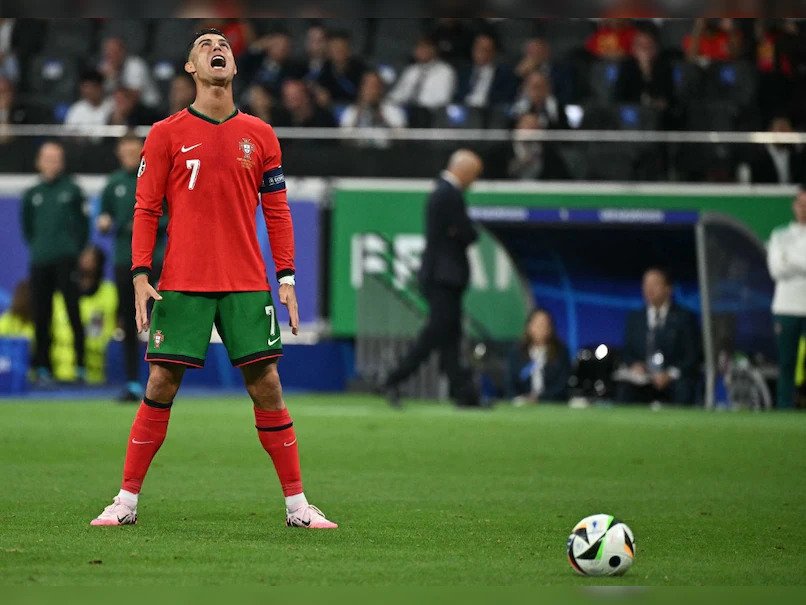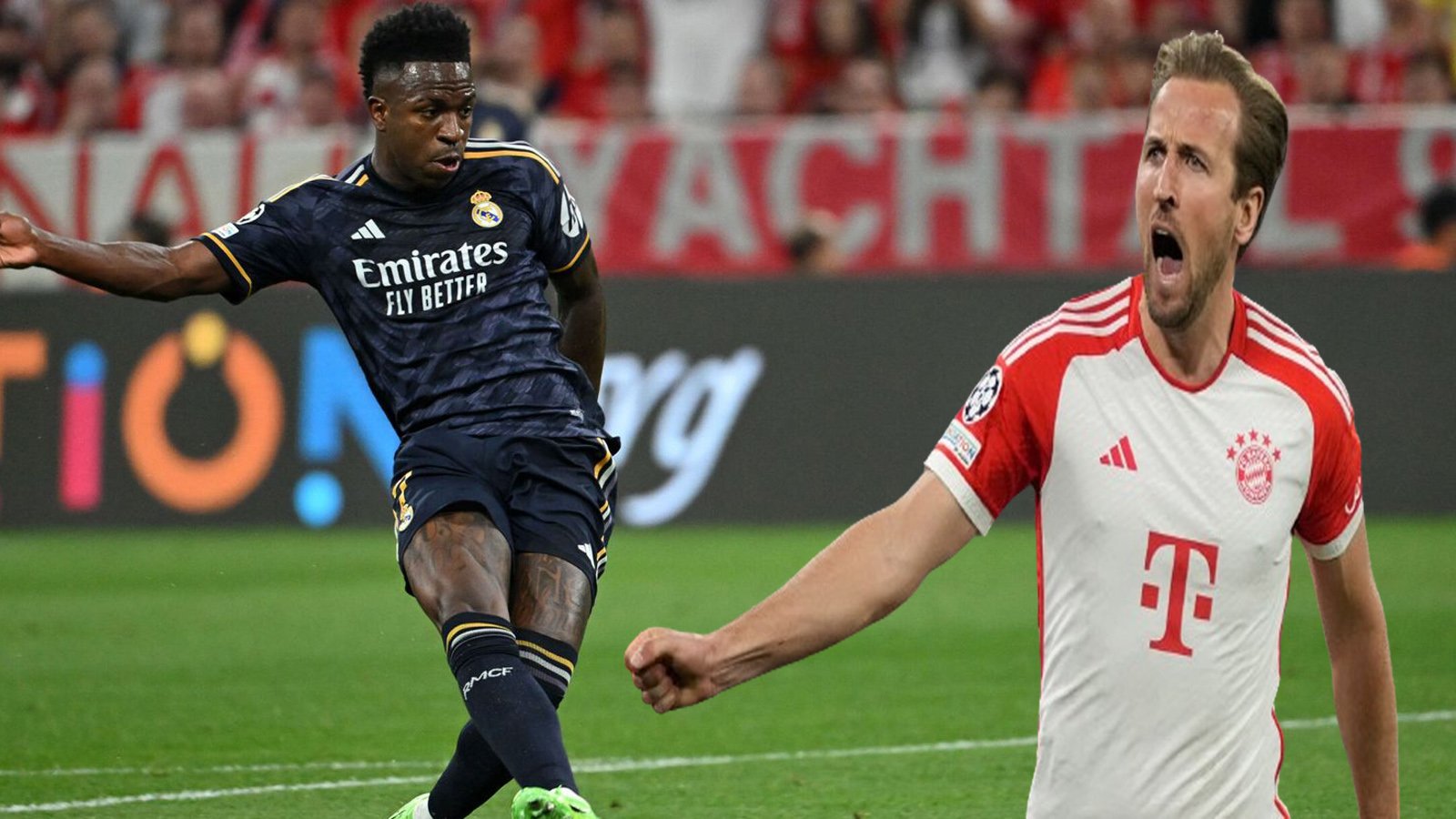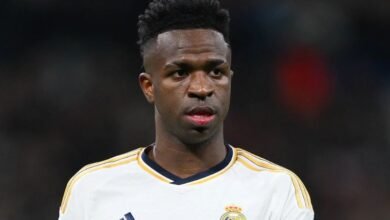History of Germany at the FIFA World Cup: Germany is among the most prominent nations worldwide in terms of football popularity.
With a wealth of talents and legends developed throughout the years, Die Mannschaft is nearly always the favorite in World Cup competitions.
Germany has a long and illustrious history in World Cup history. They have advanced to several finals and won theFIFA World Cup trophy 4 times. Additionally, they are listed on a number of FIFA World Cup records.
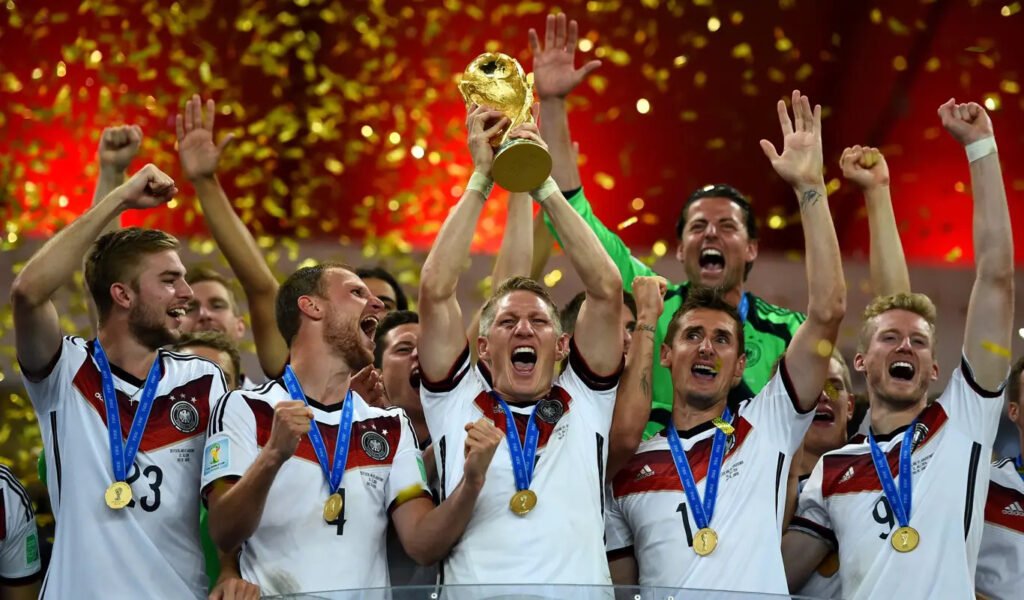
In the FIFA World Cup, Germany has four victories, four second-place finishes, four third-place finishes, and one fourth-place finish. No other country in World Cup history has been as consistent as they have been, with 12 podium finishes in 20 competitions. Furthermore, only Germany has finished on the podium in a tournament staged in every decade that has been completed (from the 1930s to the 2010s).
Apart from their reliable performances, Germany is one of the four teams that have won the World Cup without being part of their continental confederation. They did so in Brazil in 2014.
List of FIFA World Cups Won by Germany
No. | Titles | Opponents | Scores | Captains |
1. | FIFA World Cup 1954 | Hungary | 3-2 | Fritz Walter |
2. | FIFA World Cup 1974 | Netherlands | 2-1 | Franz Beckenbauer |
3. | FIFA World Cup 1990 | Argentina | 1-0 | Lothar Matthaus |
4. | FIFA World Cup 2014 | Argentina | 1-0 | Philipp Lahm |
Historic World Cup Wins: Key Moments
1. West Germany’s First Ever FIFA World Cup Triumph in 1954
1954 saw Germany, competing as West Germany at the time, win the first of their four FIFA World Cups in Switzerland. In the tournament, sixteen nations representing four distinct football confederations competed. Many people rank the World Cup final between Germany and Hungary—now known as the “Miracle of Bern”—as one of the best in football history.
With a strong campaign behind them, Hungary was considered the favorite going into the World Cup final. Before playing in the final, The Mighty Magyars, the embodiment of their golden age, had gone undefeated in 31 official international games. Notable players like Ferenc Puskas and Sandor Kocsis were part of their roster.
After playing West Germany earlier in the competition, Hungary easily defeated them 8-3, teaching them a valuable lesson in football. Hungary’s eventual victory in the World Cup in Switzerland therefore appeared inevitable.
Within the first ten minutes, Puskas and Zoltan Czibor gave Hungary a 2-0 lead, and it appeared as though the pre-tournament favorites would win the World Cup. But inside the next ten minutes, Max Morlock and Helmut Rahn’s goals gave Germany a strong comeback, bringing the score back to even.
The underdogs pulled off the unthinkable with six minutes left when Rahn scored again to cap off an incredible comeback against a tenacious Hungarian team. After the match, the West German players instantly gained notoriety as the Heroes of Bern and were etched into German football history.
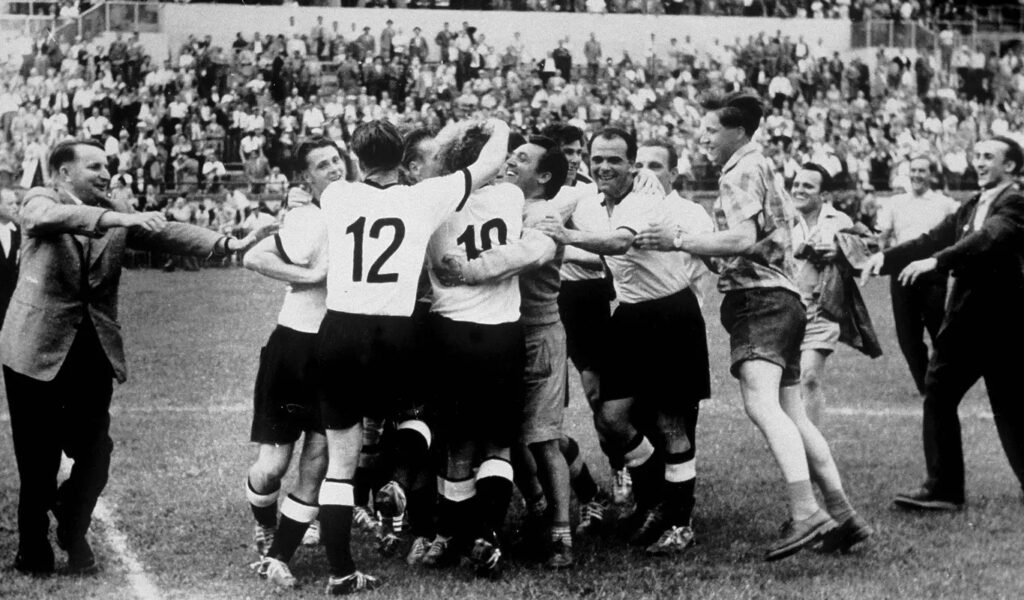
2. West Germany Beat Netherlands to Lift Their Second FIFA World Cup Title in 1974
West Germany became just the fourth host nation to win the FIFA World Cup trophy, following Uruguay in 1930, Italy in 1938, and England in 1966. West Germany hosted the FIFA World Cup for the first time in 1974. Ironically, West Germany finished in second place since they were actually defeated by their neighbors, East Germany, during the group stage.
They didn’t make any more mistakes, though, and they advanced to the 1974 World Cup final where they faced The Netherlands. At the time, the Netherlands had started their Total Football revolution, stunning every rival team in the league.
Johan Neeskens’ penalty kick, which came in 86 seconds and was the earliest goal in a World Cup final, gave the Dutch team the lead after just two minutes of play, spearheaded by manager Rinus Michels on the sidelines and the outstanding Johan Cruyff on the field. By then, German players were not even able to get a proper contact on the ball.
But just like when they accomplished it 20 years prior, West Germany had to fight back, and they succeeded in doing so when Paul Breitner scored the equalizer on a penalty kick in the 25th minute and Gerd Muller scored the winning goal shortly before halftime.
With the exception of 1950, which had no formal final, seven of the first nine World Cup winners—including Germany—had done so despite falling behind in that match. Since then, only Italy (2006) has managed to pull off the remarkable feat.
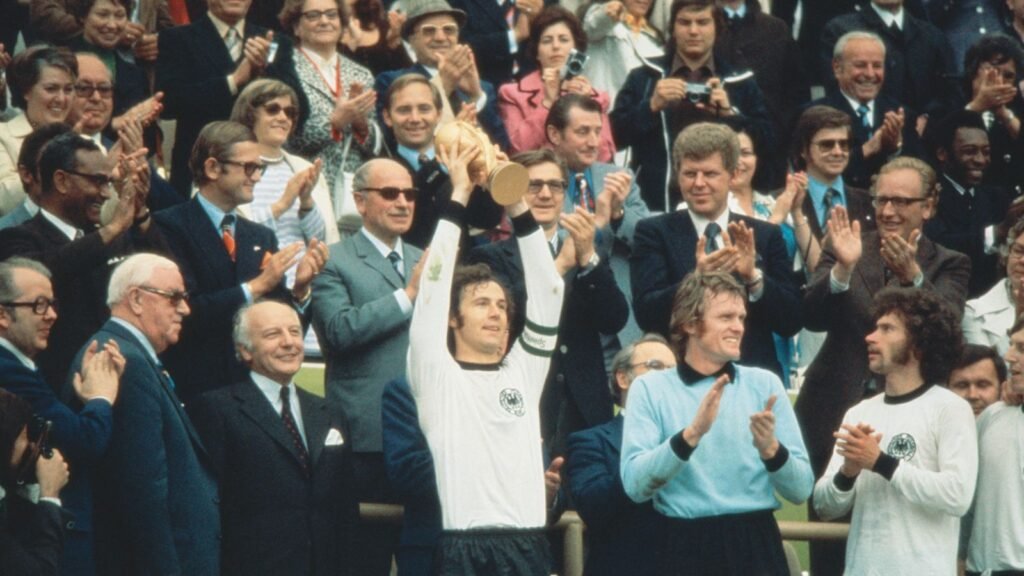
3. West Germany’s 3rd Title Came in the 1990 FIFA World Cup
Franz Beckenbauer was the head coach of the national team; he had led West Germany to victory in the 1974 World Cup on home soil. Prior to this competition, Germany had advanced to the World Cup finals in 1982 and 1986, but had finished second in each of those events. They advanced to the championship game once more, making history as the only squad to ever make it to three straight World Cup finals.
Throughout Germany’s triumphant campaign, Captain Lothar Matthäus played every minute, making him the player with the most appearances in the competition’s history (25). With four goals, he would also be the Germans’ leading scorer in the competition.
Rematching the 1986 FIFA World Cup final between West Germany and Argentina was the 1990 FIFA World Cup final. But this time, with barely five minutes remaining in the match, Andreas Brehme scored the game’s lone goal, leaving Diego Maradona’s team shorthanded. Two players from Argentina were also given the order to march off the field; Pedro Monzón (65 minutes) and Gustavo Dezotti (87 minutes) became the first players to be sent off in the history of the main tournament.
It was the first time a European team had defeated a South American team in the World Cup final, and West Germany became the first team to maintain a clean sheet in a men’s World Cup final.
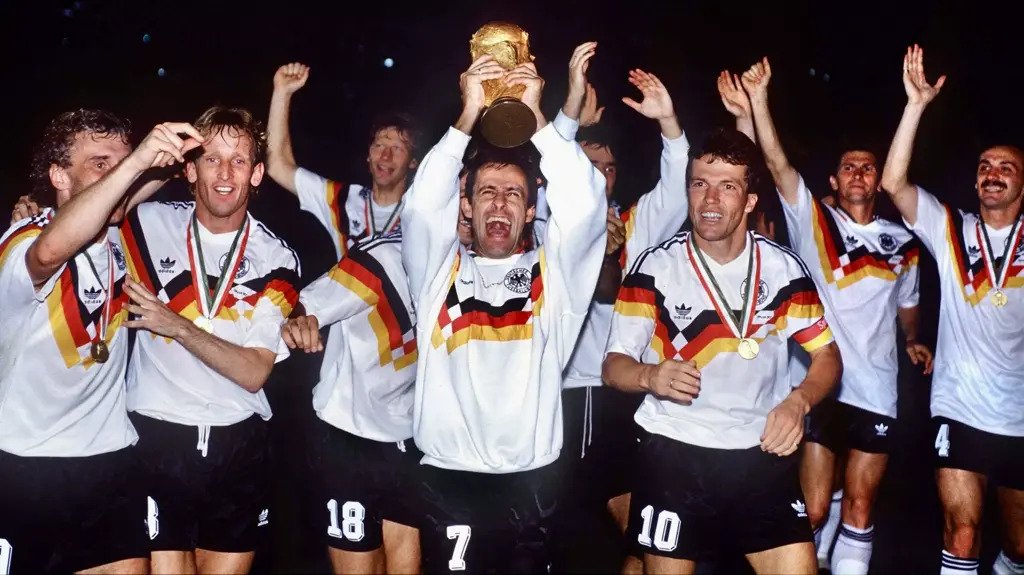
4. Germany Triumphs in the Extra Time against Argentina to Lift Their 4th Title in 2014 FIFA World Cup
Germany won their 4th FIFA World Cup title in Brazil in 2014. They were just the third country in history to win the world championship four times, behind only Brazil and Italy.
After eliminating Portugal in the group stage, Joachim Low’s squad defeated Algeria, France, and Brazil to advance to the final, where they defeated Argentina.
One of the most memorable aspects of the competition was the semifinal victory over the host Brazil in Belo Horizonte. In an insane World Cup match, the German players gave the hosts a crushing 7-1 defeat. In the match, Miroslav Klose also broke Ronaldo’s record to become the FIFA World Cup’s all-time leading goal scorer.
The World Cup final was a rematch between Argentina led by Lionel Messi and Germany from 1986 and 1990. Argentina had the greatest opportunities of the game despite being the underdogs, but players like Gonzalo Higuain and Rodrigo Palacio were unable to keep their shots on goal.
Mario Gotze, a substitute midfielder, became just the fourth substitute to score in a men’s World Cup final and the first since striker Rudi Voller in 1986, also for Germany against Argentina. However, this time it resulted in a happier ending for the Germans as Die Mannschaft defeated Argentina 1-0 in extra time.
Germany made history by being the first European team to win a World Cup in the Americas with their victory in the 2014 tournament. It was also their first World Cup victory since Germany’s 1990 reunification.
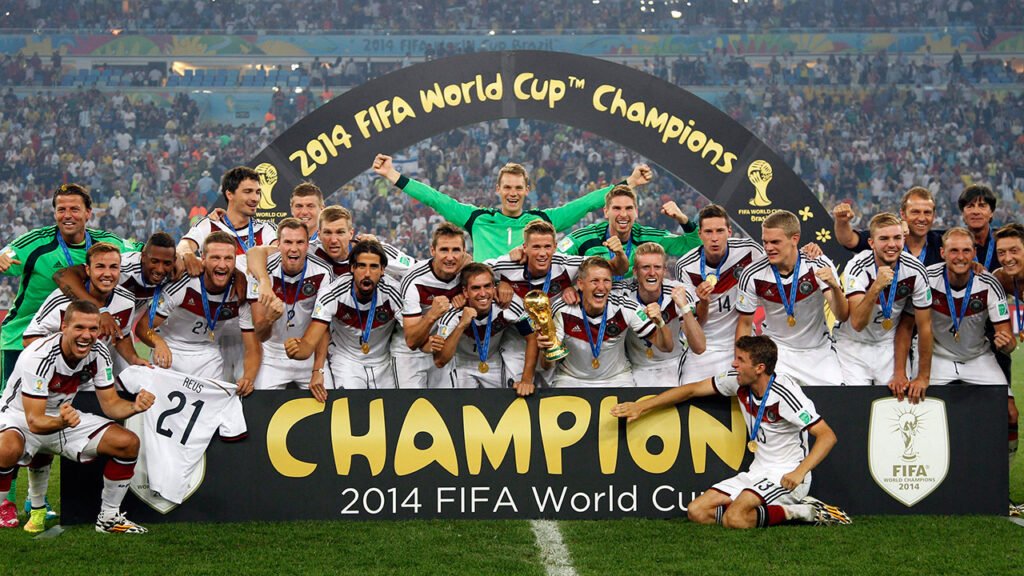
People Also Ask
Who is Germany’s top scorer all time?
With 71 goals overall as of Octorber 2024, Miroslav Klose led the German national soccer team in scoring, followed by Gerd Muller with 68 Lukas Podolski with 49.
Who is the best player on the Germany soccer team?
The three German players with the top ratings are Florian Wirtz, Antonio Rudiger, and Marc-Andre ter Stegen.
Who is the legend of Germany football?
Franz Beckenbauer, the German football (soccer) player, was born in Munich, Germany on September 11, 1945, and passed away in Salzburg, Austria on January 7, 2024. He is one of only three people to have won the World Cup both as a player and a coach (1974 and 1990, respectively).


